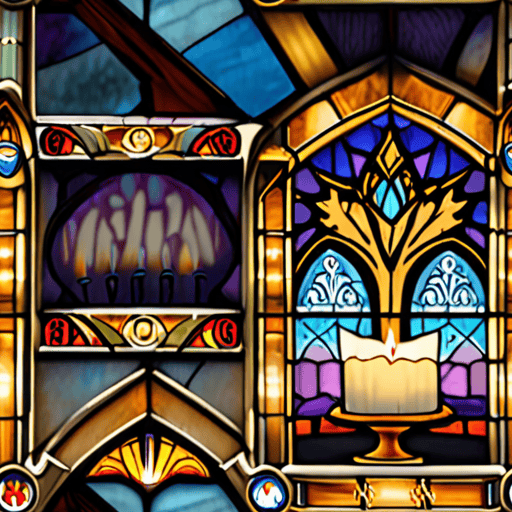For many individuals, embarking on a life-changing faith journey is a transformative experience that deepens one’s connection with their spirituality and fosters personal growth. This profound journey, often marked by moments of introspection, self-discovery, and spiritual exploration, can take many forms, from participating in Catholic pilgrimages to discovering the beauty of Catholic faith journeys. As people navigate the complexities of their faith, they may find themselves drawn to various types of faith journeys, each offering a unique perspective on the human experience and our place within the world.

The Meaning of a Faith Journey
A faith journey is a lifelong path of spiritual growth, discovery, and transformation, guided by one’s faith and values.
-
Key Components:
-
Personal Reflection:
A faith journey involves regular reflection on one’s thoughts, feelings, and experiences, seeking to deepen understanding and connection with one’s faith.
-
Spiritual Practices:
Engaging in spiritual practices such as prayer, meditation, and scripture study helps cultivate a deeper sense of faith and spirituality.
-
Community Involvement:
Connecting with others who share similar faith values and participating in community activities fosters a sense of belonging and support.
-
Service and Mission:
Embracing opportunities to serve others and live out one’s faith in practical ways brings joy, purpose, and fulfillment.
-
-
Benefits of a Faith Journey:
-
Deeper Understanding:
A faith journey leads to a greater understanding of oneself, one’s faith, and the world around us.
-
Increased Confidence:
As we grow in our faith, we become more confident in our abilities and more secure in our relationship with God.
-
Greater Purpose:
A faith journey gives us direction and purpose, helping us navigate life’s challenges and uncertainties.
-
More Meaningful Relationships:
By connecting with others through shared faith values, we build stronger, more meaningful relationships.
-
-
Challenges and Opportunities:
-
Doubt and Uncertainty:
A faith journey can involve periods of doubt and uncertainty, but these can also be opportunities for growth and deeper understanding.
-
Resistance and Criticism:
We may face resistance or criticism from others, but this can be a chance to stand firm in our convictions and share our faith with others.
-
Mission and Service:
Embracing opportunities to serve others and live out our faith in practical ways can bring joy, purpose, and fulfillment.
-
Ultimately, a faith journey is a unique and personal path that requires patience, trust, and surrender. By embracing the ups and downs, twists and turns, we can grow in our faith, deepen our understanding, and find greater purpose and meaning in life.
Journey of Faith Denomination
As a member of the Journey of Faith community, I am proud to share our denomination affiliation with you. We identify as Baptist, specifically independent Baptist, which sets us apart from other denominations. Our commitment to independence allows us to maintain autonomy in our decision-making processes and stay true to our core values.
Our Affiliation with Global Ministries Online
As part of our partnership with Global Ministries Online, we strive to provide a platform for spiritual growth and religious education. Our shared mission is to empower individuals in their faith journey through insightful articles and resources on various topics, including Christian apologetics, religious freedom, and biblical archaeology.
Key Principles Guiding Our Ministry
At Journey of Faith, we adhere to several key principles that shape our ministry:
- We believe in the authority of Scripture and its application in everyday life.
- We emphasize the importance of personal relationships with God and others.
- We recognize the need for ongoing spiritual growth and development.
- We value community involvement and outreach initiatives.
Competitor Overview
While there are many churches and ministries that share similarities with ours, we acknowledge the unique aspects of each organization. Some notable examples include:
- Independent Baptist Churches: These churches operate independently, often with a strong emphasis on local autonomy and decision-making.
- Evangelical Churches: These churches typically focus on spreading the Gospel and promoting evangelism, often with a strong emphasis on personal conversion experiences.
Conclusion
Journey of Faith is committed to serving our community and sharing the love of Christ with those around us. As an independent Baptist church, we remain true to our core values and principles, while partnering with organizations like Global Ministries Online to advance our shared mission.
The Journey of Faith Quote
The now is where our faith intersects with our lives, where each day is another step on that journey of faith.
-
Understanding the Concept of Faith
Faith is a fundamental aspect of human existence, encompassing various dimensions such as spirituality, morality, and personal values. At Global Ministries Online, we believe that faith plays a vital role in shaping our perspectives, guiding our decisions, and influencing our relationships.
-
Exploring the Journey of Faith
The journey of faith is a lifelong process, marked by moments of triumph, struggle, and transformation. As we navigate through life’s challenges, our faith serves as a compass, directing us towards hope, resilience, and purpose.
-
Key Principles Guiding the Journey of Faith
- Trust: Building trust in a higher power or divine presence enables us to surrender our fears, doubts, and uncertainties, allowing us to move forward with confidence and conviction.
- Hope: Hope is the spark that ignites our faith, inspiring us to persevere through adversity and remain optimistic about the future.
- Love: Love is the foundation upon which faith is built, fostering compassion, empathy, and kindness towards ourselves and others.
- Forgiveness: Forgiveness is essential for releasing the burdens of guilt, shame, and resentment, enabling us to heal, grow, and move forward.
-
Navigating Life’s Challenges with Faith
As we embark on the journey of faith, we encounter numerous challenges that test our resolve, patience, and trust. However, it is precisely during these moments that our faith is refined, strengthened, and transformed.
-
Cultivating a Deeper Understanding of Faith
To deepen our understanding of faith, we must engage in ongoing learning, reflection, and self-discovery. By exploring various spiritual traditions, seeking guidance from mentors, and practicing mindfulness, we can develop a richer, more nuanced appreciation for the complexities of faith.
-
Embracing the Beauty of Faith
Faith is a beautiful, multifaceted tapestry woven from threads of love, hope, trust, and forgiveness. As we weave our own stories of faith, we contribute to the rich narrative of humanity, celebrating the diversity, complexity, and beauty of our shared experiences.

Where Do Protestants Go for Pilgrimage?
Pilgrimage plays a significant role in various Christian denominations, including Protestantism.
-
Many Protestants visit sites such as Jerusalem to feel connected to Jesus and reflect on their faith.
-
However, unlike Catholics, Protestants do not typically worship saints or visit places like Walsingham.
Alternative Pilgrimage Sites for Protestants
-
The Holy Land, particularly Jerusalem, is a popular destination for Protestant pilgrims.
-
Other notable sites include the Jordan River, Mount Nebo, and the Sea of Galilee.
-
Some Protestant churches also organize pilgrimages to historical sites associated with early Christianity, such as the city of Ephesus.
Online Resources for Spiritual Growth and Pilgrimage Planning
-
Global Ministries Online provides valuable resources for spiritual growth and pilgrimage planning, including articles on Christian apologetics and biblical archaeology.
-
Other online platforms, such as Bible Study Tools and Crosswalk, offer devotional materials, Bible studies, and pilgrimage guides.
Competitor Platforms for Pilgrimage Planning
-
Catholic Travel Network offers customized pilgrimage packages for Catholics, including trips to Rome, the Holy Land, and other sacred sites.
-
Journey Catholic offers guided pilgrimages to destinations such as Italy, Spain, and Poland.
As a Protestant, it’s essential to choose a pilgrimage site that aligns with your denomination’s values and traditions. Research reputable tour operators and plan carefully to ensure a meaningful and enriching experience.
Is it Rude Not to Kneel in a Catholic Church?
In the Catholic tradition, kneeling during certain parts of the Mass is a sign of reverence and respect for God.
- Kneeling is typically required during the Consecration, which is the moment when the priest elevates the host and chalice.
- However, some people may choose to stand during this part of the Mass due to various reasons such as physical limitations or personal preference.
The General Instruction of the Roman Missal (GIRM) states that kneeling is obligatory during the Consecration, but it does not specify what happens if someone chooses to stand.
- From a theological perspective, kneeling is seen as a way to show humility and acknowledge God’s presence.
- Some argue that standing during the Consecration can be seen as a sign of disrespect or lack of reverence.
- Others believe that it is not necessarily rude to stand, but rather a personal choice that should be respected.
Ultimately, whether or not to kneel during the Mass is a matter of individual conscience and should be guided by one’s own faith and understanding of the liturgy.
As Catholics, we are called to approach the Eucharist with reverence and respect, but we should also strive to create an inclusive and welcoming environment for all worshippers.
By being mindful of our actions and intentions, we can cultivate a deeper sense of spirituality and community during the Mass.
For those who struggle with kneeling due to physical limitations, there are often alternative options available, such as standing or sitting in a pew.
It is essential to remember that the primary focus of the Mass is on worshiping God, not on adhering to specific rituals or customs.
By prioritizing our relationship with God and being respectful of others, we can create a more harmonious and enriching worship experience.
As we continue to grow in our faith, let us strive to approach the Mass with humility, reverence, and an open heart.
We can draw inspiration from the words of St. Paul, “I appeal to you therefore, brothers and sisters, by the mercies of God, to present your bodies as a living sacrifice, holy and acceptable to God, which is your rational service.” (Romans 12:1)
May we always seek to deepen our connection with God and foster a spirit of unity and love among our fellow worshippers.
For more information on Catholic traditions and practices, please visit Global Ministries Online.
Additionally, you may find helpful resources on Catholic.org and USCCB.org.
Remember to always consult with your local parish or diocese for guidance on specific liturgical practices and traditions.

What Church Do Protestants Go To?
As a Protestant, I don’t attend a traditional church with a hierarchical structure led by a pope.
- I’m part of a community that values individual interpretation of scripture and rejects certain Catholic traditions.
- My church is made up of various denominations, including Methodist, Presbyterian, Lutheran, Baptist, and Pentecostal.
Denominational Diversity
Each denomination has its own unique history, theology, and practices, yet we share a common commitment to the Bible and the principles of the Reformation.
- Methodists emphasize personal holiness and social justice.
- Presbyterians stress the importance of congregational governance and the authority of Scripture.
- Lutherans focus on justification by faith alone and the sacraments.
- Baptists prioritize believer’s baptism and congregational autonomy.
- Pentecostals emphasize the gifts of the Holy Spirit and charismatic worship.
Ministerial Leadership
In my church, we don’t have a centralized authority figure like a pope.
- Instead, we’re led by a series of ministers and clergy who work together to guide our community.
- This decentralized approach allows for greater flexibility and adaptability in our decision-making process.
Global Ministries Online
For those interested in learning more about Protestantism and exploring their faith, I recommend checking out Global Ministries Online.
Their website offers a wealth of resources on Christian apologetics, religious freedom, and biblical archaeology.

0 Comments